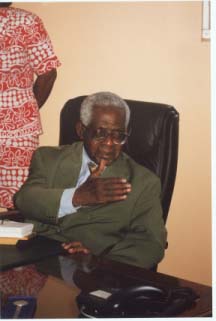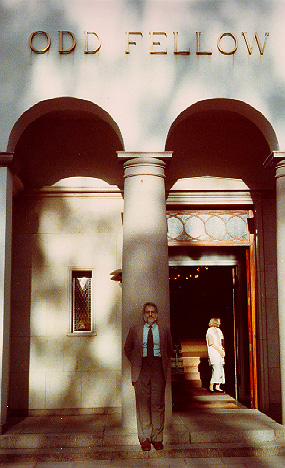

'. . . I'll still be the Vicar of Bray.'
Robert Bray
Colwell Professor of English
Illinois Wesleyan University
Welcome to the Rev. Dr. Bray's virtual stately home, Vicarage-on-Web, Macintosh, Weslyn. Here, you're invited to put your mind at ease, set your weary body down in one of these cracked and creaking but colonially comfortable leathern armchairs and sample sundry fruits and nuts from the Vicar's garden of learning: a rankly entropic place, it is true, the produce of a lifetime of running after the newof the moment before the old intellectual accounts have been settled. He often says that he will die owing the future because he is forever paying the past. Disregard such maunderings. For, withal, the Padre's is a space in the cyber cosmos as it were virtually free of spiders and snakes and all the resistant viruses of envy; that is, not lacking interest to the occasional pilgrims who share his motto: 'Genus over Species Every Time.' Our hospitality? Elevenses, yes, though the fare is invariably donuts and decaf; high tea and a decent sherry, no: but a pint of his best bitter brought brimming to your lawn table under that noble chestnut tree there next to the tumble-down gazebo. That'd be around 4, after his nap. And if you ask to pour him a stout one in return, who knows but that the evening will unfold long and lovely, a bottle or two of good claret with our sturdy dinner, conversation advancing in mirth, then declining finally with the last twilight into a kind of verspertinal sadness, sky and soul descanting purple as the port he might just decant. Ah, a consummation at best day's end perfect for such thinking, feeling persons as the Padre and you, what we used to call gentlefolk: a welcome melancholy that stirs a solemn toast to the new-risen moon [Porch Music].
Until then, he has his flock to attend to. He invites you, solus, to meander the unmown, indeed generally neglected grounds (actually, grazing would be of more help: the Padre's will and energy aren't what they were, and what with his being the only old goat around here. . . . As you leave the Deer Park, notice the cenotaph and gateway dedicated to the late Archbishop Minor Myers, Jr. Then feel free to pass through the French doors on your left into the Vicarage's library and browse if you wish: Oh, no, he won't mind your seeing all his eccentricities, what we privately call his fossilized passions, hardened into artifacts over the decades he has had the living of this parish [e. g. milady's fan]. But take care: there are a great many rooms, the lighting is antiquated, the doors and drawers, I'm afraid, rather unhelpfully labeled.
Here are a few suggestions ex libris vicarious: the Freshman Convocation Address, (Aug. '97) in which the Vicar advises, not unlike Polonius, the millennial Illinois Wesleyan University class of 2001to stop upgrading and do something.
Or would you like to duck into the Omeros Project, a labyrinthine crawl space tunnelled through Nobel laureate Derek Walcott's epic poem 'Omeros' (1990)? Unfortunately, this particular work is like Boston's 'Big Dig:' always under construction and seemingly leading nowhere.
Of possible interest is his jeu d'esprit on A.S. Byatt's novel, Possession, which argues–if that is the verb–that the character and 'works' of fictive Victorian poetess Christabel LaMotte are based on Emily Dickinson! This short treatise resides within the curio cabinet there in the corner. ('The Stones I Shaped Endure'). A second article on Dickinson, this one concerning her Fascicle 18 [what's a fascicle? You'll just have to followthe link to find out!] was published in 1997 in the Dickinson Electronic Archives.
In
November, 2001, the Vicar traveled to Martinique, where he had the
honor of meeting and talking with the great poet-politician,
Aimé Césaire. Here is a poem that resulted,
'Rèspé ba Matinik,' published in the Spring, 2004 number
of : Anthurium.
Here is a photo of Aimé Césaire (then at age 89) taken in
his office:

During that same trip to Martinique,
the Rev. Dr. Vicar Vicarious delivered a paper (which I
guess makes him an very old paperboy) at the 4th International
Conference on
Caribbean Literature. Entitled 'Knowing Grasses:
Aimé
Césaire's "Cahier d'un retour au pays natal" and Walt Whitman's
"Song of Myself,"' it has since been published in vol. 31 of Review/Revista Interamericana.
A month's sojourn in Guanajuato, México, in the summer of '03 led to some experiments in 'photo-text,' a good example of which is El Señor de la Conquista and its accompanying verse. Back home at the Vicarage, with his camera and his always-mighty pen, he has combined text and image in the same frame, as in October Versions 1
or (with text surrounding image),
A Gleaning of Grackles;
or (with text over image) lichen untwo;